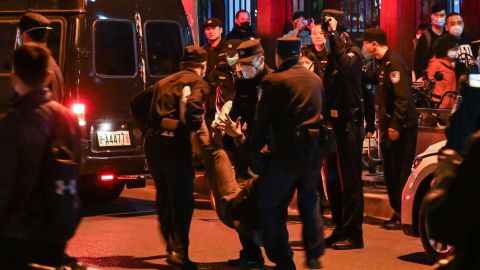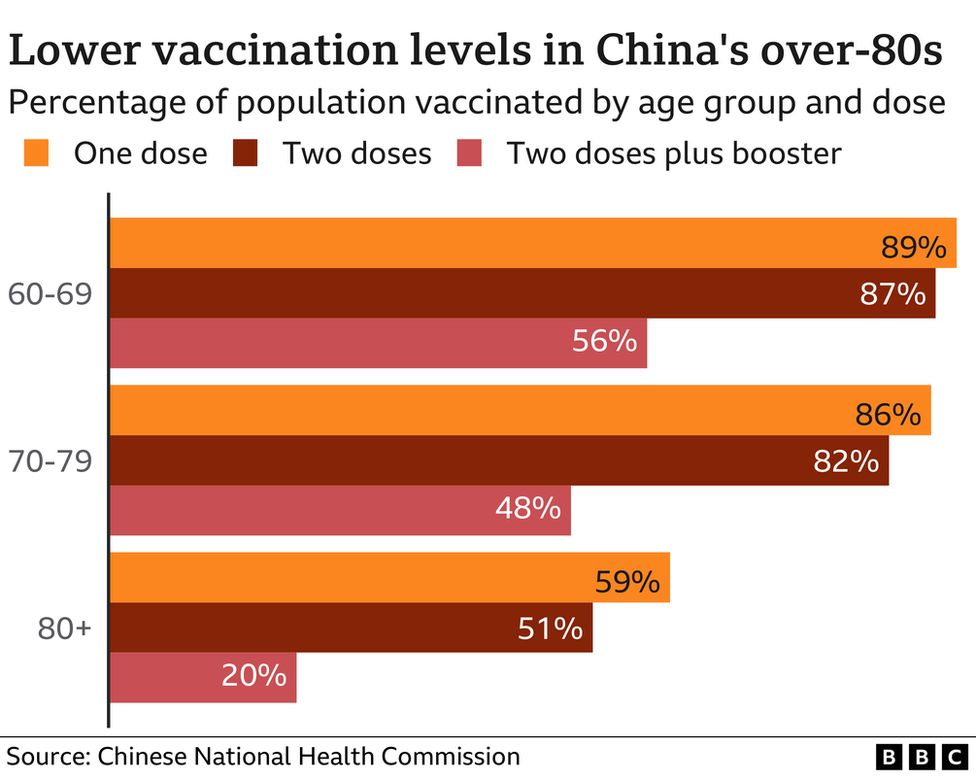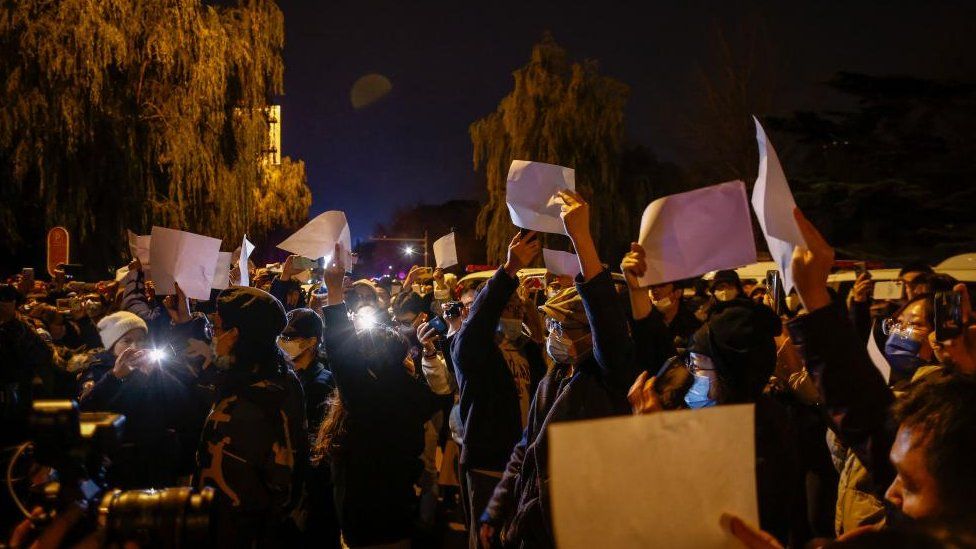The Obdurate Autocratic Failings of the Chinese Communist Party on Zero-COVID
"The party and the people are trying to seek a new equilibrium.""There will be some intsability in the process.""Without the clear signal of party leader divisions -- I would expect this kind of protest might not last very log.""[It is] unimaginable [that Xi would back down, and the party is experienced in handling protests]."Hung Ho-fung, Johns Hopkins University"[The West's vaccines offer] a major solution [to China's COVID problems.""[According to health experts zero-COVID is unlikely to be achieved until vaccine uptake among China's elderly sees an improvement].""[Efforts are underway to increase coverage but] it's unlikely things will get better for the next half of the new year."Xi Chen, associate professor, Yale University
 |
| A protester is arrested by police in Shanghai on Sunday night. HECTOR RETAMAL/AFP/AFP via Getty Image |
Local authorities in China, making no allusion to credit the mass protests springing up all over China against the crude lockup methods being employed to stem the rising tide of COVID-19 outbreaks, have begun to ease imposed restrictions reflecting the state's zero-COVID mandate. In Beijing, the city government announced it plans to phase out gating to block access to apartment compounds where infections are diagnosed.
Manufacturing and trade centre Guangzhou, the current hot-spot in the latest wave of infections, announced that selected residents no longer will be required to undergo mass testing. The stringent measures originally in place to minimize deaths at the same time that other countries suffered magnitudes of infections and deaths no longer has the silent consent of the Chinese population.
According to the Chinese Communist Party ruling China, anti-coronavirus measures must continue "targeted and precise", while at the same time the least possible disruption should be caused to people's lives; local officials threatened with their jobs or similar punishments should outbreaks occur, codify their own strategies to match the central government's zero-COVID command-and-control demands.
Their response has been the imposition of quarantines and allied restrictions exceeding what the central government recommends. Hardships imposed on the population appear to be of no concern to the Xi administration, beyond the anodyne recommendations that lockdowns not cause community unrest. Millions of people in Shanghai were placed under strict lockdown in the spring, resulting in food scarcity and access to medical care being restricted.
Despite the ensuing turmoil, Xi loyalist, the city's party secretary, saw appointment to the No.2 position of the Communist Party. On the past weekend, protests were so sweeping in numbers and inclusivity many from among the educated urban middle class of the ethnic Han majority were in full vocal attendance. This is the group the ruling party relies upon to recognize a post-Tiananmen agreement that a better quality of life would accompany autocratic rule.
Following a fire on Thursday that killed at least ten people living in an apartment building in the city of Urumqi, where residents have been locked into their homes for four months, furious protests erupted particularly when the city council suggested those that died were insufficiently motivated to save themselves, prompting an avalanche of angry online questions whether firefighters or people attempting to escape the fire were blocked by locked doors or similar pandemic restrictions.
Foreign governments have suggested to Beijing that it use vaccines developed in the West to improve protection for its people, and once more effective vaccines are widely used the government could reconsider and ratchet back the draconian restrictions of the current zero-COVID policy. Beijing has consistently refused to import the mRNA-based more highly successful vaccines developed by Pfizer-BioNTech and Moderna, insisting its own home-grown vaccines are effective.

They are not, however. Moreover, the most vulnerable in the population, the elderly, have not received vaccinations in numbers that should satisfy any responsible government. Analysis indicates that millions of unprotected people could perish under current circumstances should zero-COVID be abandoned. The acceptance of Western vaccinations could turn that scenario around.
"Europe and Germany have had very good experience with administering mRNA vaccinations", stated Steffen Hebestreit, adding that Olaf Scholz had "made this clear" to Chinese officials during a visit by the German chancellor to China. China is steadfast in its reliance on its own vaccines based on older technology, failing to offer the same protection as the West's vaccines against severe disease and death.
"'Zero COVID' [was] supposed to demonstrate the superiority of the 'Chinese model', but ended up demonstrating the risk that when authoritarian regimes make mistakes, those mistakes can be colossal.""But I think the regime has backed itself into a corner and has no way to yield. It has lots of force, and if necessary, it will use it."Andrew Nathan, Chinese politics specialist, Columbia University
 |
| Protesters are fed up with lockdowns, but their government is not budging |
Labels: Communist Party of China, Lockdowns, Mass Protests, President Xi Jinping, Vaccines, Zero-COVID
0 Comments:
Post a Comment
<< Home